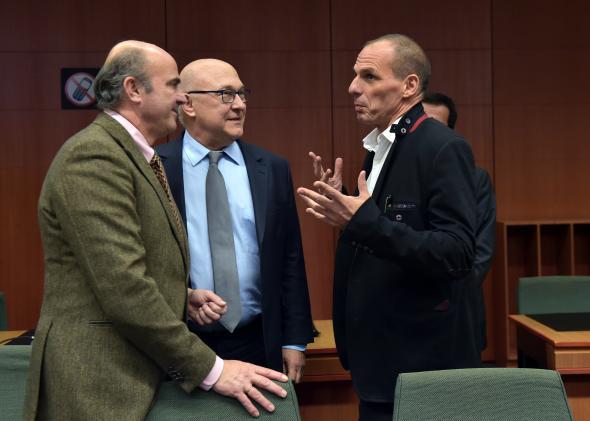There was sturm. There was drang. Somewhere, a group of masked men probably danced around and narrated the day-to-day action in song. But today, Greece finally reached a deal with the eurozone to extend its rescue package for the next four months, thereby staving off a potential financial crisis.
And, despite some stern posturing from Germany on Thursday, Athens even seems to have won some concessions. On the one hand, it won’t get the full six-month continuation it had originally asked for. It seemingly will also have to abide by the broad outlines of the previous austerity deal that Greece’s left-wing governing party, Syriza, campaigned so vehemently against. On Monday, it is scheduled to submit a list of economic reforms and budget steps—or an “action plan“—that the Eurogroup will have to approve before it actually hands out any additional cash.1 But, importantly, it appears the Greek government will finally get some wiggle room on spending.
Which is a pretty big deal. Under the previous terms of the bailout, Greece was expected to produce a surplus on its primary budget (which doesn’t include debt payments) equal to 3 percent of its gross domestic product. That was an insane expectation for a country effectively still mired in a depression, and now it seems it won’t necessarily have to live up to that commitment. In its new statement, the Eurogroup states that the country’s monitors “will, for the 2015 primary surplus target, take the economic circumstances in 2015 into account.” In other words, they may cut the country a little fiscal slack and let it spend more freely since its economy is still in disarray.
The exact terms of this accord will become clearer in the coming days. Meanwhile, the parties still need to repeat this whole process to reach a permanent bargain within the next four months. But given the utter lack of leverage Greece seemed to have had going into these negotiations, and the degree to which Germany seemed determined not to give ground, the fact that the country may walk away from this standoff with a concession is rather impressive. Greece’s electorate isn’t getting anywhere close to all the promises it voted for. But it got a small piece of them, which is more than many onlookers expected.
1So, it’s more like all the parties have agreed to agree to a deal, which could theoretically collapse again if Greece hands in a road map that doesn’t satisfy the rest of Europe. But hopefully the next steps are mostly formalities.
